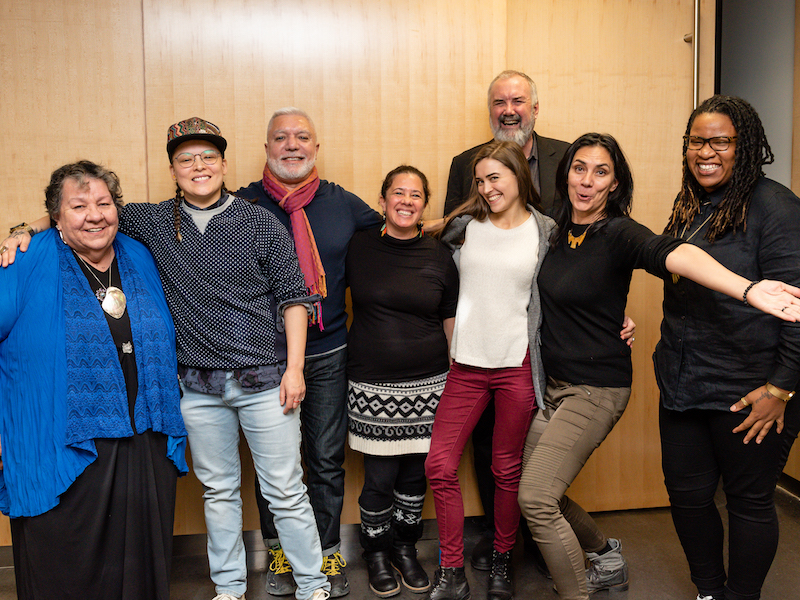Healing through dance

Twilight Dancers, a film by Theola Ross (second from left) and Paola Marino (not pictured), was among a series of short documentaries screened at Ryerson in November as part of Pimâtisiwin (Life): Indigenous Filmmakers. Photo: David Chau | www.envisiond.media (external link, opens in new window)
Ever since Theola Ross (Social Work ‘18) was a child, she’s loved to dance. During her childhood in the small, Indigenous community of Pimicikamak Cree Nation, located in northern Manitoba, square dancing and jigging would frequently play a part in family gatherings.
“The older people ... would get together and say ‘let’s get all the kids together and see who’s the best dancer of the bunch.’ I don’t want to toot my own horn, but, I would win!”
Ross’ directorial debut, Twilight Dancers (external link, opens in new window) (co-directed with Paola Marino), builds upon her lifelong interest and explores the healing power and cultural importance of dance for the remote First Nation. The documentary short film follows a group of Indigenous teenagers from the community as they compete in the square dancing and jigging categories of the 58th Winter Festival – and as they grapple with the trauma of youth suicide.
In 2016, 140 youth in Pimicikamak attempted suicide. Six young people took their own lives.
In the face of such staggering loss, how can square dancing and jigging help young people to heal? Dance can play a role in moving trauma out of the body, Ross suggests. It’s also an important vehicle for cultural expression. “Dance is an activity that incorporates the spirit, the culture. I think it’s an art of its own, in how people express themselves,” she explains.
The film touches on the history of dance in Pimicikamak, and explores how the art form has evolved over time. Square dancing was first introduced to the First Nation by settlers, however, the community has since made it their own. “I think innately it’s in our blood to move out of the structure of square dancing,” Ross says. “It’s a little bit more upright and rigid in its movements.”
“I’m seeing a little bit of those traditional movements coming out of the box,” she says. “We throw in more in the arm movements, higher kicks ... there’s a little bit more flare and fancy work.”
Historically, Indigenous communities across Canada were banned from dancing and practicing ceremony, as stipulated by the Indian Act of 1876. Despite the ban, dancing and ceremony were not completely lost, and are seeing a resurgence today. “The spirit of the culture – you can never hide that. It will come out of the body somehow. We embody our culture,” she says.
During her time as a student in the social work program at Ryerson, Ross gained a larger context for her experiences on the ground which, in turn, informed her filmmaking. “I know first-hand what the issues are when it comes to Indigenous communities ... but to come into an institution like this, to know ... the actual theory behind things that are happening systemically for Indigenous people, it definitely helped me,” she says. “It put words to the broader perspective of what I was feeling.”
While studying on a part-time basis, Ross worked in the social services sector. Her experiences in the field motivated her to use storytelling as a vehicle of expression. “Most of my story ideas come from a place of advocating for the rights of Indigenous people,” she says.
Since Twilight Dancers was filmed in 2016, Pimicikamak Cree Nation has gone through various stages of healing. “To move away from a big struggle like that, it’s evident that people are going to get together and build community strength.”
“There are a lot of expectations and a lot of those resources were put forward by community members or by leaders within the community of what is needed. The big one is mental health services, counselling ... they’re actually planning on making a healing centre on my reserve.”
Ross now works in Toronto as a Cree language instructor for Indigenous pre-school children and their families. She was recently selected by the National Screen Institute to participate in the 2019 NSI IndigiDocs (external link, opens in new window) training course, where, alongside producer Alex Fisher-Bailey, she will direct a new short documentary project: Trying to Conceive.
Pimâtisiwin (Life): Indigenous Filmmakers was organized by the Jack Layton Chair in Social Justice, Ken Moffatt, in partnership with Colectivo Toronto.
